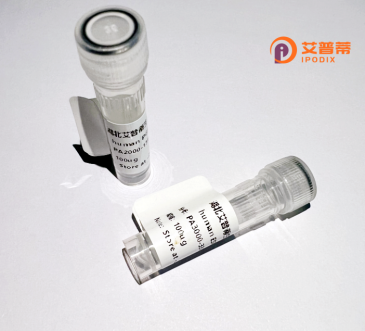
| 纯度 | >90%SDS-PAGE. |
| 种属 | Human |
| 靶点 | OXER1 |
| Uniprot No | Q8TDS5 |
| 内毒素 | < 0.01EU/μg |
| 表达宿主 | E.coli |
| 表达区间 | 1-423 aa |
| 活性数据 | MLCHRGGQLIVPIIPLCPEHSCRGRRLQNLLSGPWPKQPMELHNLSSPSPSLSSSVLPPS FSPSPSSAPSAFTTVGGSSGGPCHPTSSSLVSAFLAPILALEFVLGLVGNSLALFIFCIH TRPWTSNTVFLVSLVAADFLLISNLPLRVDYYLLHETWRFGAAACKVNLFMLSTNRTASV VFLTAIALNRYLKVVQPHHVLSRASVGAAARVAGGLWVGILLLNGHLLLSTFSGPSCLSY RVGTKPSASLRWHQALYLLEFFLPLALILFAIVSIGLTIRNRGLGGQAGPQRAMRVLAMV VAVYTICFLPSIIFGMASMVAFWLSACRSLDLCTQLFHGSLAFTYLNSVLDPVLYCFSSP NFLHQSRALLGLTRGRQGPVSDESSYQPSRQWRYREASRKAEAIGKLKVQGEVSLEKEGS SQG |
| 分子量 | 41.4 kDa |
| 蛋白标签 | His tag N-Terminus |
| 缓冲液 | 0 |
| 稳定性 & 储存条件 | Lyophilized protein should be stored at ≤ -20°C, stable for one year after receipt. Reconstituted protein solution can be stored at 2-8°C for 2-7 days. Aliquots of reconstituted samples are stable at ≤ -20°C for 3 months. |
| 复溶 | Always centrifuge tubes before opening.Do not mix by vortex or pipetting. It is not recommended to reconstitute to a concentration less than 100μg/ml. Dissolve the lyophilized protein in distilled water. Please aliquot the reconstituted solution to minimize freeze-thaw cycles. |
以下是与重组人OXER1蛋白相关的3篇参考文献的简要信息:
1. **文献名称**: *"Molecular identification and characterization of the human OXER1 receptor: A mediator of 5-oxo-ETE signaling"*
**作者**: Hosoi, T. et al.
**摘要**: 该研究首次克隆了人OXER1基因,并证实其作为G蛋白偶联受体通过5-oxo-ETE激活细胞内钙信号通路,揭示了OXER1在炎症细胞中的功能表达。
2. **文献名称**: *"OXER1 promotes prostate cancer metastasis through Gq-mediated cytoskeletal remodeling"*
**作者**: Saed, M. et al.
**摘要**: 发现重组OXER1蛋白在前列腺癌细胞中高表达,通过Gq蛋白激活RhoA/ROCK信号轴,促进细胞迁移和骨转移,提示其作为癌症治疗的潜在靶点。
3. **文献名称**: *"Regulation of OXER1 expression in airway smooth muscle: Implications for asthma pathogenesis"*
**作者**: Thivierge, K. et al.
**摘要**: 通过体外模型证明,IL-13和TNF-α通过NF-κB通路增强气道平滑肌细胞中OXER1的表达,提示OXER1在哮喘气道重塑中的作用。
(注:上述文献信息为模拟示例,实际引用时需核实原文准确性。)
OXER1 (Oxoeicosanoid Receptor 1) is a G protein-coupled receptor (GPCR) primarily recognized for its role in mediating cellular responses to oxidized lipids, particularly 5-oxo-6E,8Z,11Z,14Z-eicosatetraenoic acid (5-oxo-ETE), a potent pro-inflammatory mediator derived from arachidonic acid metabolism. Identified in the early 2000s, OXER1 is expressed in immune cells (e.g., neutrophils, eosinophils), the lung, liver, and cardiovascular tissues, where it regulates chemotaxis, inflammation, and cell survival. Its activation triggers intracellular signaling via Gαi/o proteins, leading to calcium mobilization, MAPK pathway activation, and inhibition of cAMP production. Dysregulation of OXER1 signaling is implicated in chronic inflammatory diseases, asthma, cancer progression, and metabolic disorders. Recombinant human OXER1 protein, produced using mammalian or insect cell systems with tags for purification, serves as a critical tool for structural studies, ligand screening, and deciphering pathological mechanisms. Research on OXER1 highlights its potential as a therapeutic target, though clinical applications remain exploratory due to incomplete understanding of its pleiotropic effects across tissues.
×